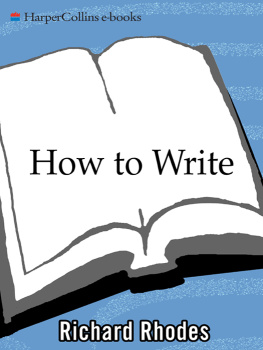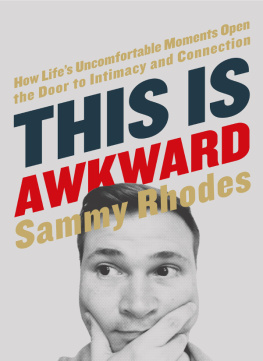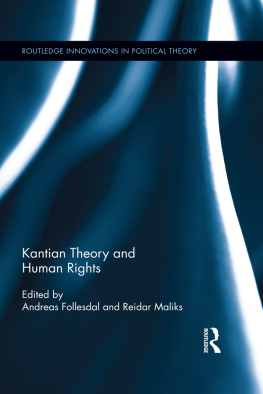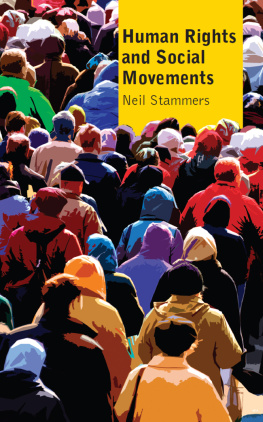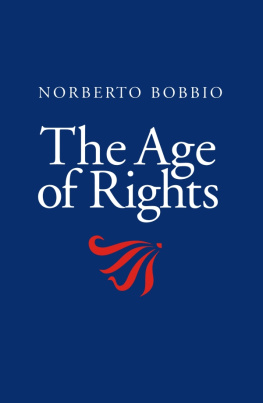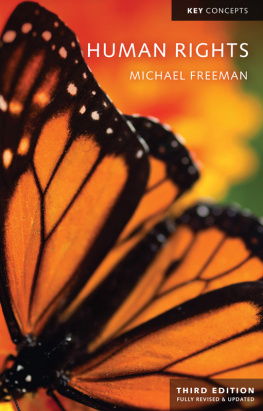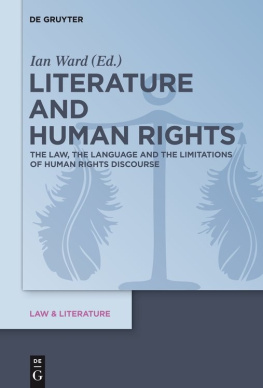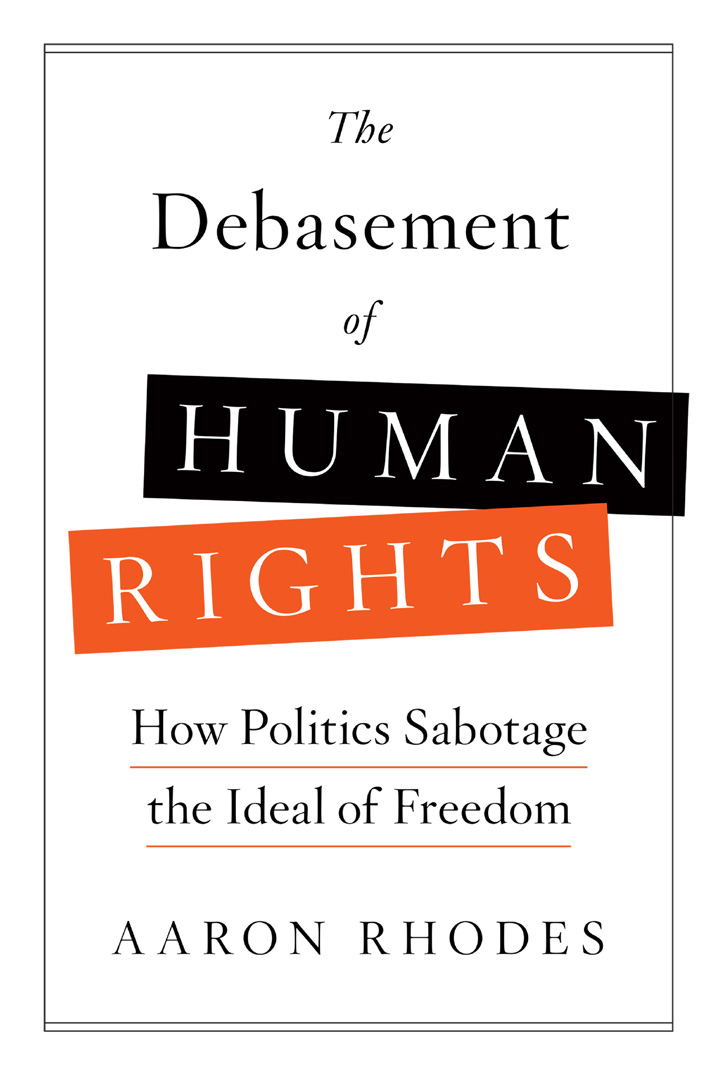Table of Contents
Guide



2018 by Aaron Rhodes
All rights reserved. No part of this publication may be reproduced, stored in a retrieval system, or transmitted, in any form or by any means, electronic, mechanical, photocopying, recording, or otherwise, without the prior written permission of Encounter Books, 900 Broadway, Suite 601, New York, New York, 10003.
First American edition published in 2018 by Encounter Books, an activity of Encounter for Culture and Education, Inc., a nonprofit, tax exempt corporation.
Encounter Books website address: www.encounterbooks.com
The paper used in this publication meets the minimum requirements of ANSI/NISO Z39.481992 (R 1997) (Permanence of Paper).
FIRST AMERICAN EDITION
LIBRARY OF CONGRESS CATALOGING-IN-PUBLICATION DATA
Names: Rhodes, Aaron Anthony, 1949 author.
Title: The debasement of human rights: how politics sabotage the ideal of freedom / by Aaron Rhodes.
Description: New York: Encounter Books, 2018. |
Includes bibliographical references and index.
Identifiers: LCCN 2017045279 (print) | LCCN 2017052447 (ebook) |
ISBN 9781594039805 (Ebook)
Subjects: LCSH: Human rightsPhilosophy. | Natural law.
Classification: LCC JC571 (ebook) | LCC JC571 .R489 2018 (print) |
DDC 323.01dc23
LC record available at https://lccn.loc.gov/2017045279
Interior page design and composition: BooksByBruce.com
Contents
I am grateful to all those who have been encouraging and helpful in the process of publishing this book, especially to Adam Bellow, Tom Palmer, Anne Pierce, Lorna Rhodes (my sister), and of course Roger Kimball and his colleagues at Encounter Books. I wish to express particular thanks to Carol Staswick for her fine work in editing the book.
Part of the work on this book was supported by a grant from the John Templeton Foundation to the Freedom Rights Project, which allowed me to work with three colleagues, Jacob Mchangama, Paulina Neuding and Guglielmo Verdirame, on the conceptual problems of human rights. I owe much to each of them. The book also benefited from research done by Marine Testut during her time as an intern. The Woodrow Wilson Center for International Scholars provided a research fellowship in 2013 for study of the Soviet dissident human rights movement in the Kennan Collection.
My colleagues in religious freedom advocacy, Willy Fautr, Kamal Fahmi, Dominic Zoehrer and Peter Zoehrer, have given important moral support for my efforts.
My wife, Anna Sunder-Plassmann, herself a human rights activist, supported our family during most of my work on the book, and I am deeply grateful for that and for her wise counsel. I dedicate this book to Anna, to our daughters Leah and Rivkah, and to my sons Daniel and Nathan.

T he international communitys concept of human rights lacks intellectual and moral integrity. It is corrupted by political ideas. A debased and contradictory understanding of human rights has allowed the concept to be exploited by authoritarian states to justify their denial of liberties and to denigrate free societies, and has encouraged ideologues to pursue political agendas under the cover of human rights. While the struggle to protect individual freedom is increasingly marginalized, the idea of human rights has been so loosely applied and so distorted that it is now used to justify restrictions on basic individual freedoms and to advocate the global regulation of an immense range of social and economic activity. The concept of human rights is now rarely informed by the ideas and principles that originally gave it meaning. It has become so much associated with ideological agendas and frivolous demands that few take it seriously anymore. The idea of human rights has been emptied of the moral force that once inspired people around the world seeking freedom and democracy.
The result is profoundly deleterious to the way we think about human rights and apply the concept through international law and institutions. To have any hope of addressing the problem, we must identify the source: the falsehood at the heart of the international communitys definition of human rights. It is a definition that mingles protections of basic individual freedoms with guaranteed state entitlements. It mixes natural rights with those established by positive law. It blurs the line between what is and is not a human right; it degrades the idea of natural rights, thus eroding the moral foundation upon which the entire edifice of human rights rests.
In this book, I show why economic and social human rights, so named under international law, are not universal human rights. Economic and social rights such as the right to social security and the right to an adequate standard of living are not simply different kinds of human rights; they are demonstrably not human rights at all, for they are based on different principles. They are rights granted by states, reflecting political values that are not intrinsic to human beings; they are collective, not individual rights; they embody political values and goals, and do not accord with the essential nonpolitical and nonpartisan character of authentic, universal human rights. They derive from particular political interests and passions, while authentic human rights are based on our common human nature and on reason, the basis of their universality.
In past decades, some have criticized the assertion that economic and social rights are universal human rights to be respected and applied in the same way as fundamental natural rights. Scholars and jurists have shown their weaknesses as human rightsthat they are vague and cannot be enforced, and do not deliver what they promise. Conservatives have disparaged economic and social rights as left-wing political utopianism. But serious critiques of economic and social rights are not widely appreciated in the current atmosphere of human rights inflation, while the international community and human rights organizations have succumbed to political and intellectual bullying on the subject. In recent years, acceptance of economic and social rights as human rights has become the norm and an unquestioned dogma, thanks largely to leftist ideological pressure and the heavy-handed influence of United Nations officials. The international human rights system is rapidly developing with a focus on extending these rights.
What is not generally recognized is how this focus has compromised the capacity of the international human rights system, and of civil society, to protect individual liberty. The issue thus needs to be reopened forcefully, to expose the problems of economic and social rights in theory and in practice. The issue needs to be addressed in both practical and philosophical terms, showing what has happened to human rights, and why it has happened.
In what follows, I examine the mingling of human rights with politics at the heart of the international system. The concept of human rights was opened up to ideological interpretations, and the field has been invaded by actors with political agendas. The international human rights system is losing its credibility under the influence of economic and social rights, leading to destructive doubts about the very idea of universal, internationally codified human rights as a standard for governments and a North Star for people everywhere in search of security, peace and freedom. The human rights package has become too big, too contradictory, too political. Any meaningful clarification of international human rights discourse hinges on removing or marginalizing the extraneous notions that have confused and debased our concept of human rights, and refocusing on protecting individual political freedom. This in turn requires a renewed understanding of the moral and intellectual foundations of human rights.


